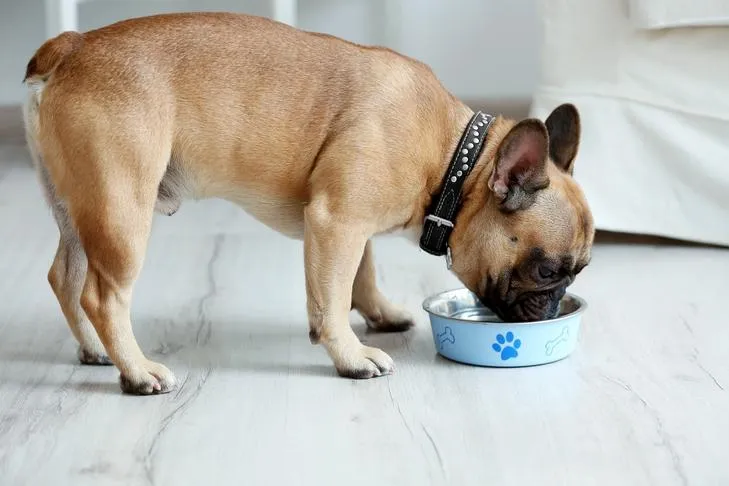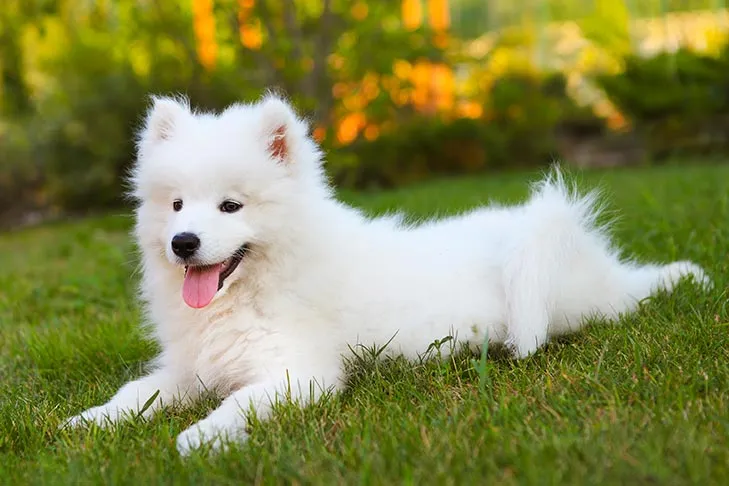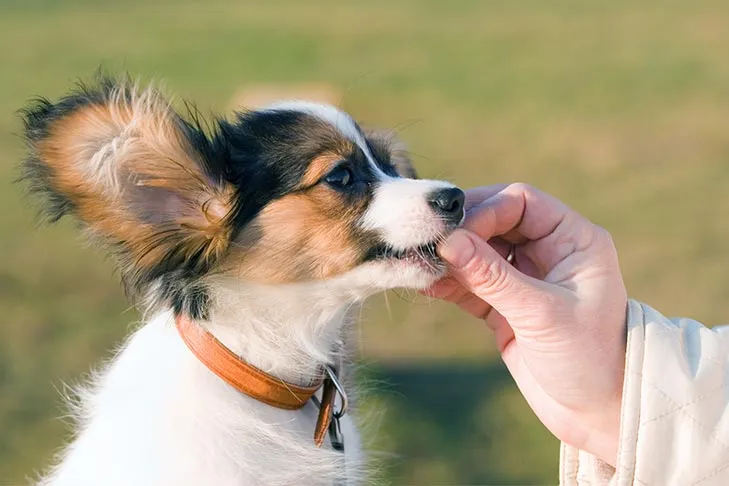Bringing a new puppy into your home is an exciting time, filled with joy, playfulness, and a lot of learning – for both of you! As a new puppy parent, one of your top priorities is ensuring your furry friend receives the best nutrition to support their rapid growth and development. While commercial puppy food is specifically formulated for their needs, you might wonder about sharing some of your own healthy snacks. Many human foods are safe and even beneficial for puppies in moderation, while others can be extremely dangerous. Knowing the difference is crucial for your puppy’s well-being. This guide will help you navigate the world of human foods safe for your growing puppy, keeping them happy and healthy as they explore all the new flavors life has to offer. Just like older dogs, puppies can enjoy a variety of human foods, but it’s important to understand the appropriate portions and preparation methods. For a broader understanding of acceptable human foods for adult dogs, you might find this article on what are dogs allowed to eat helpful as well.
Safe Human Foods for Your Puppy
Introducing new foods to your puppy should always be done gradually and in small quantities to monitor for any adverse reactions. Always opt for plain, unsalted, unseasoned, and thoroughly cooked options. Consulting your veterinarian before making significant changes to your puppy’s diet is always recommended, especially during their crucial developmental stages.
Bread
Small amounts of plain, unseasoned bread can be given to your puppy as an occasional treat. Ensure it contains no harmful ingredients like raisins or xylitol, which are toxic to dogs. While bread offers no significant nutritional benefits, it’s generally safe. Homemade bread is often a better choice than store-bought varieties, as it avoids unnecessary preservatives. However, due to its high carbohydrate and calorie content, it should only be offered sparingly to avoid weight gain.
Cashews
Cashews can be a delightful treat for puppies, but only in very small quantities. They contain beneficial nutrients like calcium, magnesium, antioxidants, and proteins. However, even though they have less fat than some other nuts, feeding too many can contribute to weight gain in puppies. Always ensure cashews are unsalted and unroasted before offering them to your young canine companion.
Cheese
Most puppies can enjoy small to moderate amounts of cheese, provided they are not lactose intolerant. While rare, lactose intolerance can occur, so introduce it cautiously. Cheese can be an excellent high-value treat for training. Opt for lower-fat varieties such as cottage cheese or mozzarella to keep calorie intake in check. Many puppies also love specialized Himalayan dog chews made from dried cheese, which can be a longer-lasting, safe option.
 Curious puppy gazing at a cheese slice on a kitchen table
Curious puppy gazing at a cheese slice on a kitchen table
Coconut
Coconut, in its various forms, can offer several health benefits for your puppy. This unique fruit contains lauric acid, known for its ability to help combat bacteria and viruses. It can also be beneficial for improving bad breath and may help alleviate certain skin conditions common in puppies, such as hot spots, flea allergies, and general itchy skin. Both coconut milk and coconut oil are safe for puppies to consume in small amounts. When giving fresh coconut, always ensure the furry outer shell is removed to prevent it from becoming a choking hazard or causing an intestinal blockage.
Corn
Corn is a common ingredient in many commercial puppy foods and is generally safe for your puppy. It provides carbohydrates and some vitamins. However, it’s crucial to serve corn off the cob, as the cob itself is indigestible and can cause intestinal blockages, which are serious medical emergencies for puppies. If sharing corn, ensure it is plain and unseasoned.
Eggs
Fully cooked eggs are an excellent source of protein and can be a fantastic addition to your puppy’s diet. They are highly digestible and can even help settle an upset stomach. It’s vital to cook eggs thoroughly, as raw egg whites contain avidin, which can interfere with biotin absorption, potentially leading to a biotin deficiency over time. Always cook eggs all the way through before offering them to your puppy, whether scrambled, boiled, or fried without oil or seasonings.
Fish
Certain types of fish, when properly prepared, can provide a significant health boost for your puppy due to their good fats and amino acids. Salmon and sardines are particularly beneficial. Salmon is rich in essential vitamins and protein, supporting overall growth and development. Sardines are unique because their small bones are soft and digestible, offering an extra boost of calcium. However, with the exception of sardines, always meticulously remove all tiny bones from other fish types, as they can pose a choking hazard or cause internal injuries.
Never feed your puppy uncooked or undercooked fish, as it can contain parasites that are highly dangerous and can cause severe illness, including vomiting, diarrhea, and dehydration, and in extreme cases, even death. Always ensure fish is fully cooked and cooled before serving, and limit fish intake to no more than twice a week as a treat.
Ham
While a small, plain piece of ham might not harm your puppy, it’s certainly not the healthiest option. Ham is typically high in sodium and fat, which are not ideal for a growing puppy’s diet and can lead to digestive upset or contribute to weight gain over time. Sharing a tiny, unseasoned piece occasionally is acceptable, but it should never become a regular habit.
 Adorable French Bulldog puppy enjoying a meal from its bowl at home
Adorable French Bulldog puppy enjoying a meal from its bowl at home
Honey
Honey is a nutrient-dense food, packed with beneficial components such as vitamin A, potassium, calcium, magnesium, copper, and a variety of antioxidants. Offering small amounts of local honey to your puppy might even help with seasonal allergies, as it gradually introduces small quantities of local pollen to their system, potentially building immunity. Beyond consumption, honey can also be used topically as a natural remedy for minor burns and superficial cuts on their skin.
Milk
Puppies can sometimes have milk, but caution is advised. While very young puppies rely on their mother’s milk, many older puppies and adult dogs develop some degree of lactose intolerance, making them unable to properly digest the sugars in cow’s milk. If your puppy is lactose intolerant, milk can cause digestive upset like diarrhea. It’s generally safe to offer a small amount to see how they react, but be vigilant for symptoms of intolerance. For hydration, water remains the best and safest option for your puppy.
Peanut Butter
Peanut butter can be an excellent and highly appealing source of protein for puppies. It also provides heart-healthy fats, essential vitamins like B and E, and niacin. When choosing peanut butter for your puppy, always opt for raw, unsalted varieties, as these are the healthiest. Crucially, always read the label carefully to ensure the peanut butter does not contain xylitol. Xylitol is an artificial sweetener commonly found in many human products and is highly toxic to dogs, even in small amounts.
Peanuts
Unlike almonds, which are generally not recommended for dogs, plain, unsalted peanuts are safe for puppies in moderation. They are a good source of healthy fats and proteins that can contribute to your puppy’s overall nutrition. However, like cashews, too much fat can lead to issues such as pancreatitis, so portion control is key. Always avoid salted peanuts, as excessive salt intake can be difficult for your puppy’s kidneys to process and can lead to sodium ion poisoning.
Popcorn
Unsalted, unbuttered, and air-popped popcorn can be an acceptable treat for your puppy in moderation. It contains riboflavin and thiamine, which support healthy eyes and digestion, along with small amounts of iron and protein. When preparing popcorn for your puppy, ensure all kernels are fully popped, as unpopped kernels can pose a serious choking hazard or cause digestive issues.
Pork
Plain, cooked pork is a highly digestible protein source, rich in amino acids that are vital for your puppy’s growth and muscle development. It can also be a good option for puppies with sensitivities to other common proteins. However, pork generally contains more calories per pound than other meats, so moderation is important to prevent excessive weight gain. Always ensure pork is thoroughly cooked, unseasoned, and all bones are removed, as cooked bones can splinter and cause internal damage.
Quinoa
Quinoa is gaining popularity as a healthy grain and can now be found in some high-quality dry dog and puppy foods. Its impressive nutritional profile makes it a beneficial alternative to more common starches like corn, wheat, and soy, which are often used in kibble. Quinoa provides essential amino acids, fiber, and various minerals, making it a healthy addition to your puppy’s diet.
 Fluffy Samoyed puppy resting peacefully in a lush green outdoor field
Fluffy Samoyed puppy resting peacefully in a lush green outdoor field
Salmon
As mentioned previously, fully cooked salmon is an outstanding source of protein, healthy fats (especially omega-3 fatty acids), and amino acids. These nutrients are crucial for promoting joint health, supporting brain development, and boosting your puppy’s immune system. However, it’s imperative to never feed your puppy raw or undercooked salmon. Such preparations can contain dangerous parasites that can cause “salmon poisoning disease,” leading to severe vomiting, diarrhea, dehydration, and potentially fatal outcomes. Cooking salmon thoroughly eliminates these parasites, making it safe for consumption.
Shrimp
A few shrimp, offered occasionally, can be a safe and healthy treat for your puppy. It is absolutely essential that the shrimp are fully cooked and that the entire shell, including the tail, head, and legs, is completely removed. Shrimp are a great source of antioxidants, vitamin B-12, and phosphorus, while also being low in fat, calories, and carbohydrates, making them a nutritious snack.
Tuna
Puppies can eat tuna, but only in very small, controlled amounts. Cooked, fresh tuna is an excellent source of omega-3 fatty acids, which are beneficial for heart and eye health. When considering canned tuna, it’s important to remember that it can contain small amounts of mercury and sodium. Therefore, a little bit of canned tuna (prepared in water, not oil, and without any added spices) given infrequently is acceptable, but excessive amounts should be avoided to prevent potential health issues.
Turkey
Plain, cooked turkey is a safe and lean protein for puppies. Before offering turkey to your puppy, make sure to remove all excess fat and skin from the meat. It’s equally important to meticulously check for and remove all bones, as poultry bones can splinter easily during digestion, potentially causing blockages or even tears in the intestines. Always avoid giving your puppy any turkey that has been seasoned with excessive salt, spices, onions, or garlic, as these ingredients can be harmful.
Wheat or Grains
Contrary to popular belief, most dogs do not need to be on a grain-free diet, and it is perfectly safe for puppies to consume grains. In fact, grains like wheat and corn are valuable sources of protein, essential fatty acids, and fiber, all of which contribute to a healthy, balanced diet. However, if your puppy has diagnosed allergies or sensitivities, your veterinarian might recommend avoiding certain grains. It’s always best to discuss your puppy’s specific dietary needs with your vet.
Yogurt
Plain yogurt can be a perfectly acceptable and even beneficial snack for your puppy. It’s a good source of protein and calcium. The active bacteria found in plain yogurt can also help strengthen your puppy’s digestive system by providing beneficial probiotics. However, similar to milk, some puppies may have trouble digesting dairy products, so introduce it cautiously. Always choose plain, unsweetened yogurt and avoid any varieties with added sugar or, especially, artificial sweeteners like xylitol, which is toxic to dogs.
 Tiny Papillon puppy delicately taking a healthy treat from a human hand
Tiny Papillon puppy delicately taking a healthy treat from a human hand
Human Foods Puppies Should Absolutely Avoid
While many human foods are safe, some are highly toxic and can cause serious illness or even be fatal to puppies. It is critical to know and strictly avoid these foods. For a comprehensive list of foods that are harmful to dogs, you can refer to resources like what people food should dogs not eat and what food a dog cannot eat. Always keep these dangerous foods out of your puppy’s reach:
- Chocolate: Contains theobromine, which is toxic to dogs.
- Grapes and Raisins: Can cause kidney failure.
- Onions, Garlic, Chives, and Leeks: Can damage red blood cells, leading to anemia.
- Avocado: Contains persin, which can cause vomiting and diarrhea.
- Macadamia Nuts: Can cause weakness, vomiting, tremors, and hyperthermia.
- Alcohol: Highly toxic and can cause serious health issues.
- Xylitol: A sugar substitute found in many sugar-free products (gum, candies, peanut butter) and is extremely dangerous, causing rapid insulin release and liver failure.
- Caffeine: Can cause heart palpitations, hyperactivity, and tremors.
- Bones (cooked): Can splinter and cause internal injuries or blockages. For safe bone options, consider researching what raw bones can puppies eat with veterinary guidance.
- Fat Trimmings and Cooked Bones: Can cause pancreatitis and choking hazards, respectively.
Conclusion
Providing your puppy with a balanced diet is fundamental to their growth, health, and happiness. While their primary nutrition should come from high-quality puppy food, incorporating certain human foods as treats or supplements can add variety and beneficial nutrients. Always remember that moderation is key, and every new food introduction should be done carefully. Prioritize plain, unseasoned options and be vigilant for any signs of digestive upset. Most importantly, familiarize yourself with the list of toxic foods and ensure they are never accessible to your curious canine companion. When in doubt, always consult your veterinarian to ensure you are making the best dietary choices for your beloved puppy. They can offer tailored advice based on your puppy’s specific breed, age, and health status, helping you navigate their nutritional journey with confidence.
